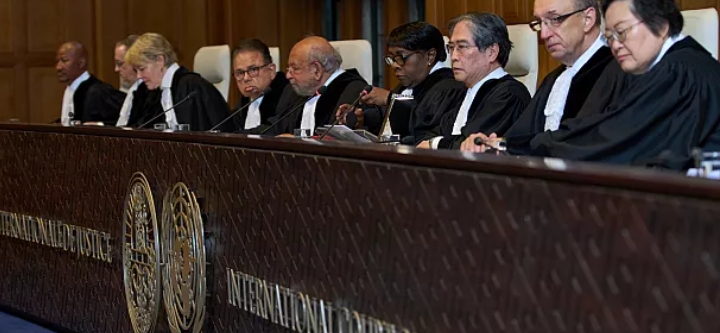The International Court of Justice (ICJ) has begun hearings on Israel's humanitarian obligations in Gaza and the West Bank, following accusations by a Palestinian diplomat that Israel is killing civilians, displacing populations, and obstructing aid efforts. While Israel denies the allegations and did not attend the hearings, the court’s non-binding opinion could influence international pressure on Israel amid the ongoing humanitarian crisis in the region.
ICJ Opens Hearings on Israel's Humanitarian Responsibilities in Gaza and West Bank


A Palestinian diplomat told the United Nations’ top court on Monday that Israel is killing and displacing civilians, as well as targeting aid workers in Gaza, amid ongoing hostilities with Hamas. Israel, which denies deliberately targeting civilians or aid staff, did not attend the hearing at the International Court of Justice. Palestinian Ambassador to the Netherlands, Ammar Hijazi, accused Israel of violating international law in the occupied territories, stating that Israel is starving, killing, and displacing Palestinians while also blocking humanitarian organizations from providing lifesaving aid.
The case stems from a request by the U.N. General Assembly last year, which asked the court for an advisory opinion on Israel’s legal responsibilities in the occupied territories, especially after Israel blocked the U.N. agency for Palestinian refugees (UNRWA) from operating within its borders. The General Assembly’s resolution, sponsored by Norway, seeks clarity on whether Israel must facilitate the provision of essential supplies to ensure Palestinian civilians' survival.
The hearings come amid a deteriorating humanitarian situation in Gaza, where Israel has blocked the entry of vital supplies, including food, medicine, and fuel, since early March. On March 18, Israel renewed airstrikes, breaking a ceasefire and seizing parts of Gaza. Despite escalating military actions, ceasefire talks remain stalled.
The World Food Program announced last week that its food stocks in Gaza had run out, leaving hundreds of thousands of Palestinians without a critical food supply. Many families are struggling to feed their children amidst the ongoing crisis.
The hearings, which include representatives from 40 states and four international organizations, are expected to last several days. The United States, which voted against the U.N. resolution, is scheduled to speak on Wednesday. While the court’s advisory opinion is non-binding, experts suggest that it could influence international law, shape public opinion, and increase pressure on Israel to ease its humanitarian restrictions.
Israel has long criticized U.N. bodies, including the court, accusing them of bias against the country. Israel’s Foreign Minister Gideon Saar rejected the case, asserting that the U.N. and its institutions have weaponized international law against Israel’s right to self-defense.
The case also highlights tensions between Israel and UNRWA, which has been accused by Israeli officials of being infiltrated by Hamas. Israel's foreign ministry presented evidence, including documents and videos, linking UNRWA staff to Hamas militants, although the U.N. agency rejected these claims. Israel’s ban on UNRWA, which began in January, severely limits the agency’s ability to operate within Israel-controlled areas.
UNRWA, established in 1949 to assist Palestinian refugees, has been providing health, education, and emergency services to millions of Palestinians in Gaza, the West Bank, and beyond. As the conflict continues, Israel’s military campaign in Gaza has resulted in over 51,000 Palestinian deaths, according to the Gaza Health Ministry. Israel claims that it has killed around 20,000 militants, but has not provided public evidence to support this figure.
The court’s ruling, which could take several months, will not be legally binding but could have significant implications for Israel’s relations with the U.N., the international community, and the ongoing humanitarian crisis in Gaza.

 বাংলা
বাংলা  Spanish
Spanish  Arabic
Arabic  French
French  Chinese
Chinese 
